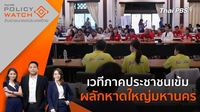As Thailand gears up for the upcoming municipal elections on Sunday, May 11, 2025, the cities of Hat Yai and Khon Kaen are witnessing heightened public engagement and debates surrounding local governance. In Hat Yai, Songkhla, two significant public forums have been organized, allowing citizens to voice their concerns and expectations from their future mayor. This grassroots initiative reflects a growing trend of civic participation in the political process, with residents eager to influence the direction of their communities.
In Khon Kaen, the local municipality is currently under scrutiny due to allegations of potential violations of the Royal Decree 68, which pertains to municipal area management. Reports indicate that the Khon Kaen municipality has secured a substantial budget of 985 million baht, making it the second-highest in the country, just behind Nonthaburi. This financial backing raises questions about transparency and the effective use of public funds, as citizens express concerns about the management of these resources.
Meanwhile, the Chiang Mai municipality is also a focal point in this election cycle, boasting a management budget of approximately 1.7 billion baht. This significant sum positions Chiang Mai as a central economic hub in northern Thailand. With around 90,000 eligible voters in the municipality, the outcomes of this election could have far-reaching implications for future electoral contests in the region.
As local officials prepare for the elections, they are met with a mix of optimism and skepticism from the public. Citizens are particularly attentive to how their votes will influence local governance and resource allocation. The Melayu Raya initiative, aimed at enhancing youth awareness about environmental issues and disaster preparedness, is one of the many discussions taking place in the lead-up to the elections.
In the midst of these local political dynamics, ThaiBev, the largest beverage producer in Thailand, has announced its plans to enter the stock market. The company is set to offer 612 million shares in an initial public offering (IPO), which will be available to the public for the first time. This move is part of a broader strategy to expand its business and enhance financial flexibility.
According to reports from the Office of the Trade Competition Commission, ThaiBev is preparing to list its shares on the Stock Exchange of Thailand (SET) under the food and beverage sector. The company has established a strong presence in 63 out of 77 provinces in Thailand, as well as in Laos, where it holds a 100% stake in Lao Coca-Cola Bottling Co., Ltd. (LCCB). This extensive reach underscores ThaiBev's dominance in the beverage market, particularly in the non-alcoholic ready-to-drink (NARTD) segment.
The IPO will consist of 612,451,687 shares, representing 10% of the total outstanding shares after the capital increase. Funds raised from this offering are earmarked for business expansion and general working capital, with a commitment to distributing at least 50% of net profits as dividends to shareholders.
Market analysts predict that the NARTD market in Thailand will experience a compound annual growth rate (CAGR) of 7.4% from 2024 to 2029, potentially reaching a market value of 337.6 billion baht by 2029. ThaiBev's strategic positioning within this growing market, coupled with its robust distribution network, positions the company for continued success.
As the elections approach, the public is keenly aware of the implications of their choices, not only for local governance but also for the broader economic landscape. The interplay between local political dynamics and corporate developments like ThaiBev's IPO highlights the interconnected nature of governance and business in Thailand.
In light of the upcoming municipal elections, citizens are encouraged to engage in the democratic process by participating in debates and discussions. The outcomes of these elections will shape the future of local governance, impacting everything from budget allocations to community initiatives.
The anticipation surrounding the elections and the corporate developments in the beverage industry signifies a pivotal moment for Thailand. As citizens prepare to cast their votes, the importance of informed decision-making becomes paramount.
In the coming days, the public will continue to monitor the political landscape, with hopes that their voices will be heard and that their elected officials will prioritize transparency and effective governance. The convergence of local political engagement and significant corporate movements sets the stage for an eventful period in Thailand's civic and economic narrative.





